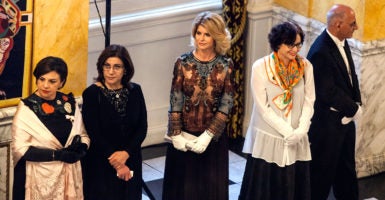I recently came across Stanley Sloan’s Dec. 7 Facebook post, in which he let his friends and followers know that his planned address for the Dec. 10 celebration of NATO’s 70th anniversary was abruptly canceled by the Danish Atlantic Council.
The cancellation was due to the decision by the U.S. Embassy in Copenhagen not to support Sloan’s participation. The chief reason for that, spurred by U.S. Ambassador Carla Sands, was his strong criticism of President Donald Trump.
On Facebook, Sloan posted what was to have been his entire keynote speech, “Crisis in Transatlantic Relations: What Future Will We Choose?” He had been scheduled to speak after Sands, but because he was dropped from the program, Lars Bangert Struwe, the head of the Danish Atlantic Council, had little choice but to cancel the entire event.
With all due respect for Sloan’s 50 years of expertise and experience as a top expert on U.S.-European relations and as a visiting scholar at Vermont’s Middlebury College, nonresident senior fellow at the Scowcroft Center of the Atlantic Council of the United States, and associate fellow at the Austrian Institute for European Security Policy with expertise in national defense and NATO, he surely must have known that the harshly critical tone of his speech would not be greenlit by any ambassador representing the president of the United States.
But he likely took the risk because, as he asserted, he had earned the right to use the platform to sound the alarm with your critique.
When I travel abroad and deliver keynote addresses with heads of states, ambassadors, and other dignitaries present, I don’t levy such critiques. That’s the case even if I have fundamental concerns or disagreements on behalf of my country over issues, or even when I disagree with a policy while visiting a country.
That’s not to say constructive criticism shouldn’t occur, or that questions about a process, protocol, or procedure shouldn’t be raised. But surely Sloan understands that the authorized representative of the president would respond to a critique like his as she did.
I saw Sloan’s tweet in which he stated that he was “overwhelmed by the support” he has been receiving after his participation in the celebration of NATO’s 70th anniversary “was vetoed by the ambassador to Denmark.”
While Sloan no doubt has a lot of support for his views, it is my experience working with embassies around the world that otherwise support free speech that no speaker would be allowed to take the stage, after the U.S. ambassador speaks, to harshly criticize a sitting U.S. president, regardless of political party.
That speech, in that forum, would not have been permitted under Presidents Barack Obama, George W. Bush, Bill Clinton, George H.W. Bush, or Ronald Reagan. I can say that without fear of contradiction, because, with the exception of Reagan, I have met all of these presidents, spent time with them in various capacities, and worked on behalf of two administrations to promote public diplomacy throughout the world.
NATO’s many challenges—from Brexit to Turkey purchasing a missile defense system from Russia—need to be illuminated coherently and not through the prism of opposition to the president.
With his intellect and experience, Sloan could have discussed these and other issues without ascribing a possible failure of NATO to the U.S. president. NATO’s challenges, which have indeed expanded beyond its original founding mission of 70 years ago to fight Soviet aggression, are undeniably real. As such, Sloan had the opportunity for a robust critique that could strike a chord of unity and solutions for the alliance you are clearly passionate about.
The important issue of collective defense under NATO’s Article 5 and concerns over Russia’s continued dangerous moves (which Sloan did mention in his speech), the growing Chinese threat, and other challenges facing the non-free world can’t be reiterated enough.
I concur with Sloan with his view, stated in his 2018 testimony to the Senate Foreign Relations Committee, that “the [NATO] alliance remains so important to American society.” NATO is indeed necessary, as are newer strategic concepts of collective security in which preserving freedom, democracy, and civility are paramount.
But as I noted before, keynote addresses or even main talking points are submitted in advance of a speech such as the one in question, and discussions are had with the host or hosts on the focus of the speech. Such preparation might include feedback prior to the actual speech and might well include proscribing—or editing out parts of—a presentation.
The last-minute nature of the invitation to Sloan didn’t allow for the latter and consequently set up a tenuous moment that caused embarrassment for Denmark’s Atlantic Council, the U.S. Embassy in Denmark, and, yes, Sloan himself.
Sloan undeniably has freedom of speech. However, understanding the nature of his platform was imperative, and the privilege he had was sacrificed because of what he was going to present, given the event sponsor, the U.S. Embassy in Denmark. As a fellow professional, I believe Sloan’s message could have been presented differently and still have had tremendous outcomes.































